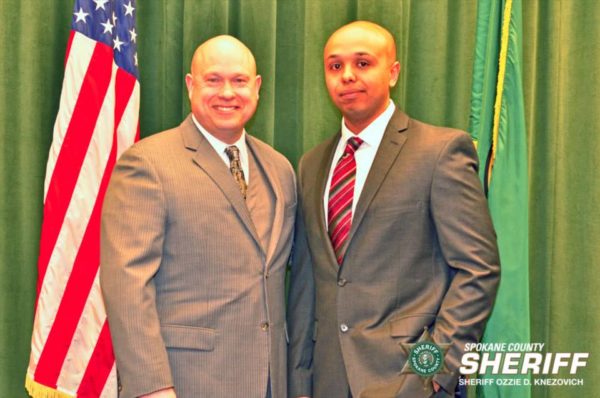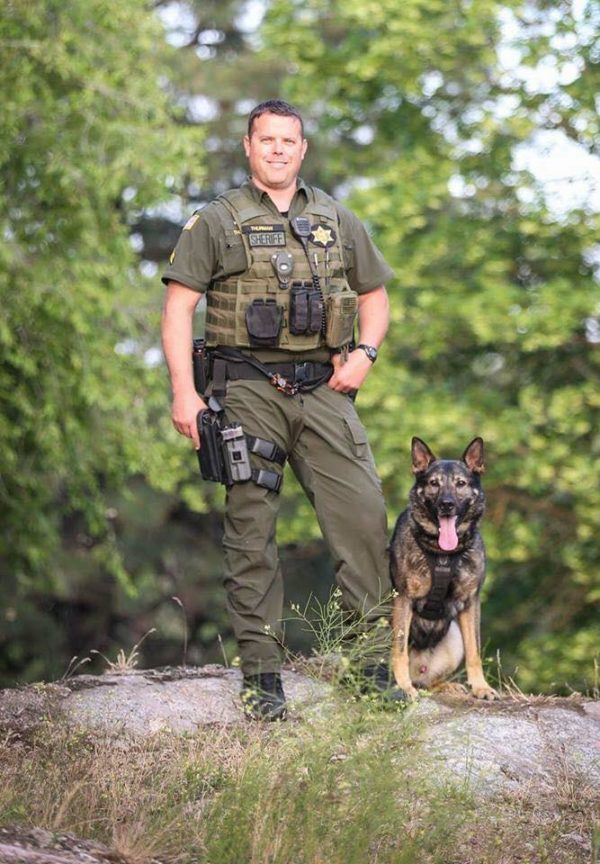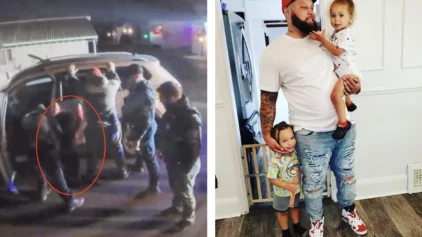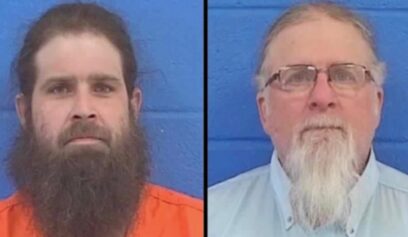In December 2016, then-Spokane County Sheriff’s Deputy Andrew Richmond was sitting in squad car having a roadside chat with Tyler Kullman, one of his fellow deputies.
The two had just responded to a call together and they were speaking through their open car windows when Richmond, who is Black, overheard a disturbing phone call that blared from Kullman’s vehicle through his Bluetooth speaker.
“You ready to kill some ni–ers tonight, or what?” someone asked Kullman, who is white.
The culprit was Sgt. Jeffrey Thurman, a white K-9 deputy who worked alongside Richmond. Thurman later explained that he was referring to “inner city” Black people who “riot and loot” when he used the slur. But Richmond remained shaken by the racist comment.
The Black deputy eventually reported his co-worker, and an investigation brought to light more racist and sexist behavior that led to Thurman being terminated.
Afterward, Richmond became a target of discrimination in the sheriff’s office, according to a lawsuit he recently filed in federal court. He faced retaliatory behavior that stifled his advancement opportunities, and his bosses did little to protect him. The department grew so hostile Richmond, the lawsuit claims, resigned and took a much lower-paying position with less rank at a smaller agency.
According to Richmond’s lawsuit, he was punished by his colleagues for breaching the unwritten code of silence that exists among the ranks of law enforcement, stopping officers from reporting misconduct by their comrades.
To make matters worse, he was a Black deputy reporting the racism of a beloved white deputy in a county whose population was just 2 percent African-American. Richmond was one of only two Black deputies on the force at the Spokane County Sheriff’s Office.
Richmond filed his lawsuit March 30 in U.S. District Court in Washington state. He is being represented by Heather Barden, a Spokane employment attorney.
“There is a culture, especially in this area — I would say in eastern Washington — that needs to be addressed,” Barden told Atlanta Black Star in a phone interview Friday afternoon.
The sheriff’s office is the lone defendant named in the 18-page complaint, which insists Richmond’s bosses did nothing to shield him from discrimination and retaliatory behavior he faced in the department. According to the federal suit, his workplace grew hostile and he was forced to quit and take a much lower-paying position with less rank at a smaller agency.
The lawsuit seeks damages for racial discrimination, retaliation and constructive discharge.
“It’s not just about him [Richmond],” Barden said. “It’s the principle behind it for him that he doesn’t want to see this happen to any other officers, whether they’re African-American, Mexican, Filipino, Hispanic or whatever other nationality or race they may be. They shouldn’t have to go through this.”

Richmond joined the Sheriff’s Office in May 2014 after spending two years as a policeman in other agencies. He dreamed of following in the footsteps of his father, who was a Spokane County sheriff’s detective.
Thurman was the handler of Laslo, a well-known K-9 deputy that assisted in nearly 500 arrests. Richmond’s lawsuit details the blue wall of silence he alleges was built around Thurman, who’d been employed with the sheriff’s office since 2001.
“There must be action taken to eliminate the code of silence…and it needs to start now,” Barden wrote.
Richmond spoke to at least three supervisors about Thurman’s racist comments between 2016 and 2018, including Sgt. Damon Simmons, the only other Black deputy on the force. None of them pushed it up the chain of command.
Sheriff Ozzie Knezovich didn’t become aware of Thurman’s inflammatory rhetoric until Richmond filed a formal complaint with his union in May 2019. The sheriff’s office responded by opening up an internal affairs investigation.
In his union complaint, Richmond also alleged he was blocked from consideration for a position with the sheriff’s office air support unit, claiming it was an act of retaliation. Before filing the formal grievance, Richmond told his union president about Thurman’s remarks. The union chief notified Spokane County Undersheriff David Ellis, who claimed Richmond was passed over for the air support promotion because he had “too many” other specialty positions.
But Richmond didn’t hold any such positions at the time, according to his federal lawsuit.
The lawsuit indicated the undersheriff later told Richmond that Thurman made the ultimate decision as to who got appointed to the air support unit. Thurman and Ellis had a “close personal relationship.”
Investigators interviewed several employees during the sheriff’s office’s internal probe. Kullman, the deputy Thurman was talking to when he made his “kill some ni–ers” comment, said they were close friends. He told investigators Thurman used the N-word regularly when discussing Black Lives Matter and often “talked about killing African-Americans.”
Kullman wasn’t the only deputy who’d overheard Thurman use the N-word on multiple occasions while on duty. At least one other deputy testified to the fact. Two female officers also reported on-the-job sexual harassment by Thurman. One deputy said he told her she’d come back from a work trip “pregnant” if they had to share a hotel room, the lawsuit indicated. Thurman was the officer’s supervisor at the time.
“He was able to act however he pleased, even if it was discriminatory or racist, which is unfortunate,” Barden said. “Whether it was a female minority or an African-American minority, it just seems like he monopolized that and used that to his advantage to overpower people.
“But no matter how well liked somebody is or how good they are at their job, that doesn’t wash away your discriminatory acts or statements,” she added.
When investigators questioned Richmond, he reiterated his claims that racial discrimination kept him from being hired for the air support unit, noting Thurman was part of the interview process. He claimed a sergeant told him “command staff” blocked him from getting the promotion for an unknown reason and instructed him to “keep his mouth shut.” Otherwise, he would get passed over in the future. Barden, in the federal complaint, said that was a violation of department policy.
Sheriff Knezovich stopped the investigation and refused to allow the undersheriff to be questioned. He deemed Richmond’s retaliation complaint unfounded. But he believed the reports about Thurman’s racist comments and fired the longtime deputy in June 2019. Knezovich held a press conference and told local media the language was “reprehensible” and asserted that “type of behavior will never be tolerated.” He also said the sergeants that Richmond reported Thurman to before filing his formal complaint should have brought the allegations forth much sooner.
“These things have to be sent up the chain, and they have to be dealt with,” Knezovich said.
Thurman did not contest his termination, but less that three weeks after he lost his job, he filed a $12.5 million tort claim for defamation against Knezovich, The Spokesman-Review reported. Thurman lodged the formal lawsuit in Spokane County superior court and the case is scheduled to go to trial in November, court records show.

After Thurman’s termination, Richmond was targeted by some of the ex-deputy’s supporters. Yet, the sheriff’s office officials took no steps to protect Richmond from the backlash, his lawsuit indicates. When news of Thurman’s departure broke, the agency circulated a memo to employees that identified Richmond as the whistleblower that lodged the complaint. Many co-workers began questioning him about “randomly” reporting Thurman.
Audio recordings of the internal affairs interviews even leaked out to employees, the suit indicates. And two of Thurman’s friends, high-ranking deputies in the precinct where Richmond was stationed, retaliated by spreading false rumors amongst the ranks that Richmond was having a sexual fling with one of his former female recruits. One of those deputies went as far as saying he found nothing wrong with Thurman using the N-word or talking about “killing ni–ers.”
Knezovich called Richmond and asked him about the rumors. He later transferred Richmond to a different precinct after the sheriff learned about the abuse Richmond was taking from the two ranking deputies in his office. Neither of them were reprimanded or disciplined.
On July 29, 2019, Richmond quit his job as deputy and to escape “the toxic SCSO culture.” He joined the Spokane Police Department, where he took a substantial pay cut and lost his rank.
“Richmond faced retaliation and harassment for reporting Thurman’s racist comments and initiating an IA investigation against Thurman,” the lawsuit summarized. “Richmond reported to the elected sheriff, Knezovich, that he continued to face retaliation from others, including his direct chain of command because of the Thurman investigation. Knezovich and the county did nothing to protect Richmond. Instead, Richmond was moved from the…location where the hostile work environment persisted until Richmond had no choice but to quit.”
Knezovich issued a statement denouncing the former deputy and denying his claims. He made no qualms that the sheriff’s office intends to put up a fight.
“I am extremely disappointed that Andrew Richmond has taken this course of action,” Knezovich said, according to KHQ 6. “The Sheriff’s Office denies that it took any retaliatory or discriminatory action toward Andrew Richmond. We thoroughly investigated Mr. Richmond’s allegations in 2019 and took care to observe all parties’ rights during the process.”


